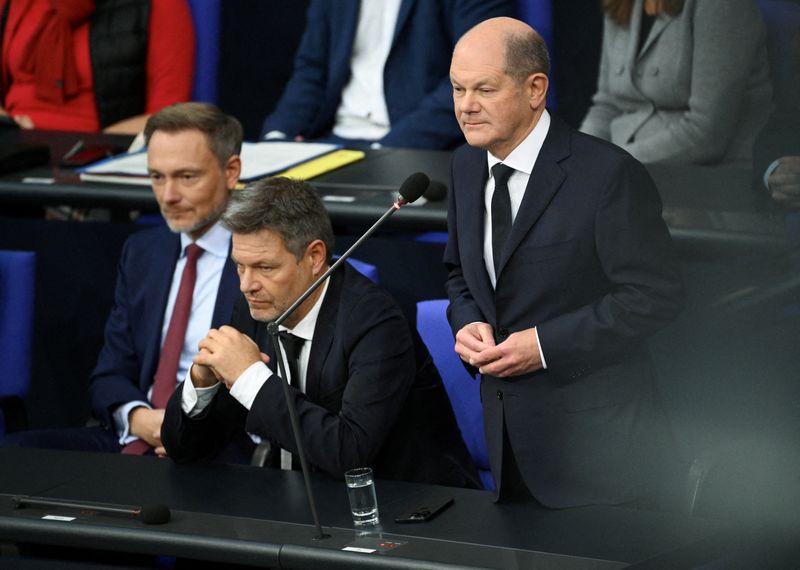By Holger Hansen and Andreas Rinke
BERLIN (Reuters) -German Chancellor Olaf Scholz's coalition on Wednesday indefinitely postponed talks on next year's budget as it struggled to find a way out of a crisis caused by a court ruling that blew a 60 billion euro ($65 billion) hole in its finances.
The delay to the talks, which were scheduled in parliament for Thursday, underscored the challenge facing the government after the constitutional court blocked the transfer of unused pandemic funds towards green investments and industry support.
It has sparked warnings that growth in Germany's already wobbling economy could get dragged down next year and that projects and subsidies to keep its industry competitive were now at risk.
The three parties in Social Democrat (SPD) Scholz's uneasy coalition with the Greens and pro-business Free Democrats (FDP) are trying to hammer out a solution to keep as many spending pledges as possible - and make them legally compliant.
Their options include drawing up a supplementary budget for 2023 and suspending Germany's self-imposed debt brake before reinstating it for next year.
"Our goal is to discuss the budget quickly but with due care," said a joint statement of ruling party lawmakers.
Speaking at a joint news conference with Italian Prime Minister Giorgia Meloni in Berlin, Scholz said a proposed budget would now be deliberated with a sense of urgency in parliament, while still giving everyone time for careful checks.
The delay has heightened uncertainty about spending in all areas of the German economy and meant the 2024 budget might not be concluded before the end of the year.
The government has already imposed a freeze on most new spending commitments and blocked spending from the 200 billion euro Economic Stabilisation Fund for this year.
Almost every item of spending that has not yet been formally approved is up in the air. Among the uncertainties is aid for Ukraine.
The government had planned to double military aid to Ukraine to 8 billion euros next year but a defence ministry spokesperson would not be drawn on whether the pledge would be kept, referring to ongoing to discussions.
"The political fallout from Germany’s constitutional court ruling continues to rock German politics and is now impacting EU politics as well, making a deal over a revised EU budget a lot less likely at the 14-15 December European Council, and even threatening the bloc’s €50bn commitment to fund Ukraine through 2027," said a note by the Eurasia Group.
INDUSTRY URGES CLARITY
Greens Economy Minister Robert Habeck has warned that Germany's place as an investment hub is at stake, as well as jobs, and industry chiefs have called for clarity quickly.
"German industry is looking at the current political situation with the greatest concern," said Siegfried Russwurm, president of the BDI industry association.
Underscoring the jitters, a minister in the state of Saxony-Anhalt warned the billions in subsidies for U.S. chipmaker were at risk.
Such a move, and a similar threat to investments by Taiwanese chipmaker TSMC, would undercut Germany's plans to base critical industry on home soil as part of a policy overhaul after the Russian invasion of Ukraine.
So far, Berlin has stuck by an agreement for 10 billion euros in subsidies with Intel (NASDAQ:INTC), which will develop two chipmaking plants.
"I firmly assume that the commitments for Intel and TSMC will remain," a government source said, adding: "This is very important to the chancellor, as well as to the economy minister."

The influential VDA autos association, which represents giants like BMW (ETR:BMWG) and Volkswagen (ETR:VOWG_p) as well as smaller suppliers, urged the government to provide a clear, reliable basis for planning as quickly as possible. The government must be "more committed and determined than before in pushing ahead with energy partnerships and trade and raw materials agreements to strengthen Germany as an industrial location," a spokesperson for the VDA said.
Industrial firm Thyssenkrupp (ETR:TKAG) acknowledged that the budget ructions may have repercussions on Germany's hydrogen sector, a nascent industry Scholz has pinned a lot of hopes on. "We need to get ... into conversations with possible suppliers of hydrogen and then get answers from them. This will happen in the course of next early 2024 and we will see how far hydrogen is available," CEO Miguel Lopez said.